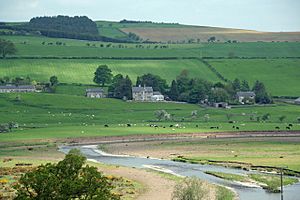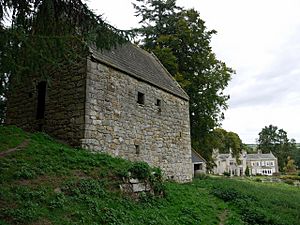Hepple facts for kids
Quick facts for kids Hepple |
|
|---|---|
 Hepple |
|
| Population | 144 (2011) |
| OS grid reference | NT985005 |
| Civil parish |
|
| Unitary authority |
|
| Ceremonial county | |
| Region | |
| Country | England |
| Sovereign state | United Kingdom |
| Post town | MORPETH |
| Postcode district | NE65 |
| Police | Northumbria |
| Fire | Northumberland |
| Ambulance | North East |
| EU Parliament | North East England |
| UK Parliament |
|
Hepple is a small and quiet village located in the beautiful countryside of Northumberland, England. It's about 4 miles west of a town called Rothbury, where people from Hepple often go for shops and services. The village sits right on the edge of the Northumberland National Park, which is a huge area of protected nature. It's also found along the River Coquet.
During World War II, Hepple was part of something called the Coquet Stop Line. This was a line of defenses built to slow down any invading forces. You can still see a "pillbox" here, which is a small concrete bunker used for defense. Hepple is also on the main road that connects Rothbury to another village called Otterburn. In Hepple, you'll find a church, a village hall, and a post office.
Exploring Hepple's History
Hepple is a place with a long history, especially when it comes to its old buildings. These structures tell stories of how people lived and protected themselves many centuries ago.
Hepple Tower: A Medieval Ruin
About half a mile northeast of Hepple village, you can find the remains of Hepple Tower. This tower house was built way back in the 1300s, during the medieval period. It was likely a strong home for a wealthy family, designed to protect them from attacks. Today, it's a ruin, meaning it's mostly fallen apart, but it's still an important historical site. English Heritage, an organization that looks after historical places, has listed Hepple Tower as a "building at risk." This means it needs special care to stop it from falling apart completely.
Woodhouses Bastle: A Strong Farmhouse
About a mile west of Hepple, near a country house called Holystone Grange, is a building known as Woodhouses Bastle. A "bastle" is a type of strong, fortified farmhouse that was common in this border region between England and Scotland. These homes were built to protect families and their animals from raiders. Woodhouses Bastle was built in 1602. It has been repaired and given a new roof in the 20th century, so it's very well-preserved. Some historians think it might have originally been a "pele tower," which is another type of small, defensive tower, before it was changed into a bastle.
 | Valerie Thomas |
 | Frederick McKinley Jones |
 | George Edward Alcorn Jr. |
 | Thomas Mensah |



